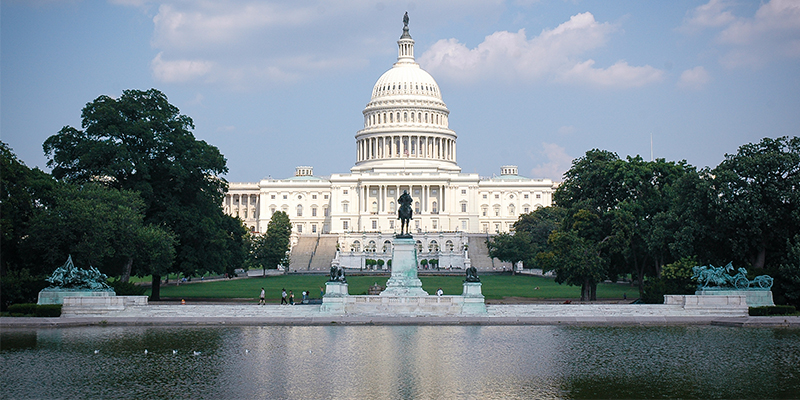By Aquiles Suarez
The “One, Big, Beautiful Bill” containing much of President Donald Trump and congressional Republicans’ domestic agenda, and which has bedeviled House Speaker Mike Johnson for most of the year, finally appears to be headed for a vote on the House floor. With a 220-213 margin, House Republicans can only lose three votes. Disagreements between a handful of fiscal conservatives and GOP moderates over cuts in government spending and removing the cap on the state and local tax (SALT) deduction have made Johnson’s legislative task nearly impossible. But as of the time of this writing, early Wednesday, Johnson looks to put this budget reconciliation bill up for a vote late today or Thursday, thereby meeting his goal of passing this bill by Memorial Day.
How did commercial real estate fare? The bottom line: Barring any last-minute changes to certain provisions, this bill represents a major victory for NAIOP and the commercial real estate industry.
At the beginning of this year, NAIOP’s advocacy on federal tax policy focused on extending important provisions in the Tax Cuts and Jobs Act of 2017 (TCJA) that were expiring at the end of this year. Additionally, we were advocating for the creation of a federal adaptive reuse tax credit that would help spur the conversion of a number of underutilized commercial structures to residential use, thereby addressing the historically high commercial vacancies in many of our nation’s communities.
But as is usually the case, along the way of drafting legislation, new and unexpected issues of concern also became top priorities. Chief among these was a proposal to eliminate the current deduction available to businesses for payment of state and local taxes, which was seen as a way of raising a lot of revenue for the bill. Since, on average, property taxes account for approximately 40% of the expenses of real estate enterprises, this so-called “business SALT” proposal would have been a huge tax hike on the industry.
In addition, Trump has repeatedly called for changing the tax treatment of carried interests from capital gains to ordinary income. Past attempts at taxing carried interests at higher ordinary income rates have been rejected by Republican Congresses that recognized the harmful impact this would have on real estate entrepreneurs, so this push, coming from a Republican president, was an unwelcome development. Ensuring that neither of those proposals were adopted became a top focus for NAIOP.
The legislation contains none of the harmful proposals or changes that were of concern:
- Business SALT: no changes were made to the deductibility of state and local business-related property taxes.
- Carried interests: remain taxed at the capital gains rate.
- Section 1031 like-kind exchanges: unchanged.
- Tax rates: no increases in ordinary income tax rates.
The bill also contains numerous provisions which we strongly supported:
- Bonus depreciation: an extension of 100% bonus depreciation for qualified property placed in service from Jan. 20, 2025, through 2029. Additionally, the legislation allows 100% expensing for property used in the manufacturing, production or refining of tangible personal property.
- Permanent pass-through deduction: the expiring Section 199A 20% deduction for qualified business income of partnerships and other pass-through entities is increased to 23% and made permanent.
- Interest expense limitation: modifies the business expense limitation to reinstate a calculation that increases the deduction for the taxpayer, effective from Jan. 1, 2025, through Dec. 31, 2029.
- Opportunity Zones: the program is continued until 2033, and calls for a redesignation of opportunity zones which would include additional focus on rural areas. The bill would make other changes and is likely to be further modified by the Senate, where Senator Tim Scott (R-SC) was the chief sponsor of the program.
- Low-income housing tax credit: 12.5% increase in the allocation of low-income housing tax credits to States for four years through 2029, with further changes to facilitate the use of private activity bond financing.
- Estate tax exemption: The estate and gift tax exemption is increased to $15 million per individual, to be adjusted annually for inflation.
A compromise on the individual SALT cap deduction acceptable to Republicans from high-tax states will be included in the bill. Reports are that the cap would rise to $40,000 over a period of years for a married couple with incomes up to $500,000. And while we had hoped that a conversion tax credit would be included in the House reconciliation bill, this became unlikely when the task faced by leadership was to reduce the fiscal impact of the bill to appease conservatives. We will continue discussions with the Senate, and introduction of a bipartisan conversion tax incentive bill in the House by Representatives Mike Carey (R-OH) and Jimmy Gomez (D-CA) is a step in the right direction.
In order to raise revenue and comply with the requirements of budget reconciliation, the bill eliminates many of the clean energy tax credits that were part of the Inflation Reduction Act of 2021 (IRA). This will likely be a point of contention with Senate Republicans once the House passes the legislation, and the Senate will soon have its turn once that happens. Of course, NAIOP’s advocacy on behalf of the industry will continue with the Senate, and until final tax legislation is signed into law by the president, to ensure that the final product continues to support NAIOP members and a vibrant commercial real estate industry.








